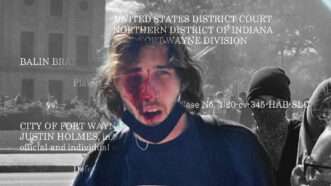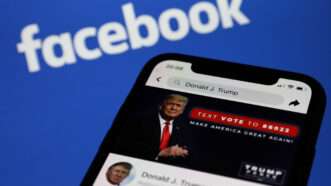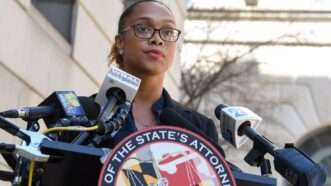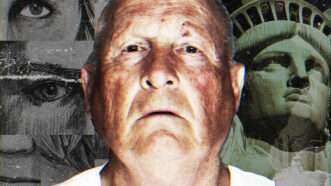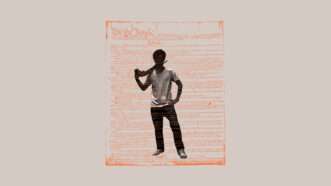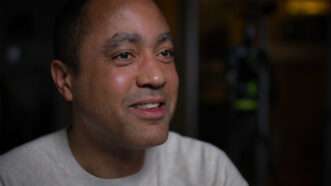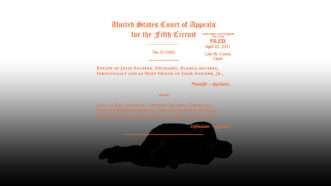Civil Liberties
Risky Pleading in Sex-Related Libel Cases
If plaintiff broadly claims that defendant libeled her by "imputing unchastity," she risks having to disclose a lot about her sexual history.
Another "Racial Ridicule" Arrest in Connecticut, This One for an Online Insult
But the "racial ridicule" statute under which this is happening (1) by its terms doesn't cover such speech, and (2) if it did, it would be unconstitutional.
Anyone Who 'Aids or Abets' Abortion Could Be Sued Under New Texas 'Heartbeat Bill'
Plus: Death penalty proposed for Atlanta massage parlor shooter, judge tosses Google antitrust suit, and more...
He Lost His Eye After a Cop Allegedly Fired a Tear Gas Canister at His Face. The Officer Says He Has Qualified Immunity.
If the officer succeeds, the victim will not be allowed to sue on those claims.
No Preliminary Injunctions Against Libel, Magistrate Judge Reaffirms
And claims of veiled threats don't change that.
ATF's Proposed Rules Threaten a Legal Mess but No End to Ghost Guns
Regulations might reshape DIY gun products, but they can’t eliminate the demand that created the industry.
More on the New Taboo: Accurately Quoting Source Documents in University Classrooms
Rutgers Law School, the National Coalition on Censorship, and the Washington Post.
My New "Dissenting Opinions" Podcast
some heterodox views about Supreme Court opinions, and more
Wash. Court Reverses Order Banning "Defamatory and Harassing" Posts About Judge and Court Employees
It's an unconstitutional prior restraint, the court holds.
"How Often Do You Think People Make False Accusations" Related to Sexual Misconduct, Discrimination, or Retaliation?
"All the times," "sometimes," or "rarely"? A prominent public university's training module requires faculty to give a particular answer.
The Police Dog Who Cried Drugs at Every Traffic Stop
Cops laugh about “probable cause on four legs” but the damage to innocent lives is real.
Sixth Circuit Rules Property Owners Can go to Federal Court to Argue Takings Clause Bars Seizure of Home Equity in Cases Where Property is Foreclosed to Pay off Tax Delinquencies
The ruling may be the first major effect of the Supreme Court's 2019 decision in Knick v. Township of Scott, which ruled that property owners are not required to "exhaust" state court remedies before filing takings cases in federal court.
John Samples: Facebook's Oversight Board Was Right To Uphold Trump Ban
A member of the board (and a Cato Institute vice president) defends the controversial decision to kick the former president off the social media platform.
Baltimore's Top Prosecutor Attempts To Send FCC Against Local Fox Affiliate
Don’t call yourself a supporter of the First Amendment while attempting to punish a media outlet for criticizing you.
How Detectives Caught the Golden State Killer—and Unleashed a Catastrophe for Civil Liberties
Police were finally able to catch the serial killer using DNA genealogy databases—violating many innocent people's constitutional right to privacy.
Texas Lawmakers Push a Likely Unconstitutional Ban on Plant-Based Food Producers Labeling Their Products 'Meat,' 'Beef,' 'Pork'
Producers of plant-based meats argue these restrictions violate the First Amendment.
Bust a Deal, Face the Wheel, Here for Colleges and Settlements for Lawsuits Over Expulsions
A student was expelled by St. John Fisher College for alleged sexual misconduct, but was then acquitted at a criminal trial and sued the college; the college agreed to confidentiality to settle the case, but then allegedly breached the agreement.
The FBI Seized Heirlooms, Coins, and Cash From Hundreds of Safe Deposit Boxes in Beverly Hills, Despite Knowing 'Some' Belonged to 'Honest Citizens'
Victims of the FBI's constitutionally dubious raid say they've been told to come forward and identify themselves if they want their stuff back.
Recent Developments in Controversies About Quoting Slurs from Court Cases
A CNN story on the Rutgers law school controversy; the settlement agreement in the firing of Central Michigan University professor Tim Boudreau; and the views of Prof. Nadine Strossen, former President of the ACLU.
"When an Individual Brings a Claim with Respect to Which Her Disabilities Are Central,"
“the public has a substantial interest in knowing about those disabilities so it can meaningfully oversee the Court’s exercise of its judicial power.”
Baltimore Prosecutor Asking FCC to Investigate TV Station for Criticizing Her
The elected prosecutor (Baltimore State’s Attorney Marilyn Mosby) is claiming that the station's coverage of her is "blatantly slanted, dishonest, misleading, racist, and extremely dangerous."
We Reply to Anonymous Above The Law Columnist's Response to Our "The New Taboo: Quoting Epithets in the Classroom and Beyond"
Above the Law refused to publish our reply, so we're publishing it here.
Eldridge Cleaver: The Mormon Years
Friday A/V Club: A former Black Panther's winding path
N.Y. Court Pressuring Mother to Remove Rock with Small Painted Confederate Flag
"Given that the child is of mixed race, it would seem apparent that the presence of the flag is not in the child's best interests, as the mother must encourage and teach the child to embrace her mixed race identity, rather than thrust her into a world that only makes sense through the tortured lens of cognitive dissonance."
Arizona's Newly Enacted Forfeiture Reforms Will Make It Harder for Cops To Steal Property
The new law requires a criminal conviction prior to civil forfeiture and beefs up due process protections for property owners.
Judges Stick Up for Asset Forfeiture Victim
When officers searched Jermaine Sanders' car, they found less than half an ounce of marijuana and seized $17,000 of his money.
9th Circuit Hears Contradictory Arguments on Whether People Aged 18 to 20 Have a Right To Buy Weapons
California insists those under 21 were legally "infants" in Founding Era; plaintiffs insist they were always part of "militia"
Cops Receive Qualified Immunity for Coercing a 13-Year-Old Into Confessing to a Murder He Didn't Commit
The boy was sentenced to 25 years' imprisonment.
Whose Rules Should Govern How Americans Speak with Other Americans?
(1) American law? (2) Rules set by a large corporation? (3) International law?
Florida Legislators Exempt Their Favorite Companies From Social Media Bill
"It's very obvious that nobody involved in [the bill] consulted a First Amendment lawyer," says TechFreedom's Berin Szóka.
John McWhorter: 'The Idea That America Is All About Despising Black People? That's Fantasy.'
The Columbia linguist discusses his new book Nine Nasty Words and dismisses the ideological excesses of the 'anti-racism' movement.
Cops Who Killed a Man While Holding Him in a Hog-Tie Position Got Qualified Immunity. The Appeals Court Wasn't Having It.
Up for debate was whether or not it was "clearly established" that officers cannot apply injurious force to a subject who isn't resisting.
College Soccer Player Suing Coach Who Benched Her After She Refused to Kneel During Protest
Punishing players for kneeling, or not kneeling, is a First Amendment violation at public universities.
John McWhorter on Cursing, Anti-Racism, and Why 'We Need to Stop Being So Afraid'
Columbia University linguist John McWhorter on "anti-racism" as a new, misguided civic religion and his new book on curses, Nine Nasty Words.
Kevin Spacey Sex Abuse Plaintiff Can't Sue Under Pseudonym
The lawsuit stems from an alleged sexual relationship between the plaintiff and Spacey over 35 years ago, when the plaintiff was 14.
When Fighting 'Misinformation' Is Really Fighting Free Speech
There is no "fake news" exception to the First Amendment.
Prof. John McWhorter (Columbia) on "People Getting Fired for Referring to the N-Word - Activism or Performance Art?"
Today's item in Prof. McWhorter's substack newsletter, "It Bears Mentioning." (I just subscribed, for $60 for the year, though you can also subscribe for $5/month.)
Voters Have Defeated a Texas School District's Plan To Punish Students for Microaggressions
The opposition to Southlake's plan was understandable.



